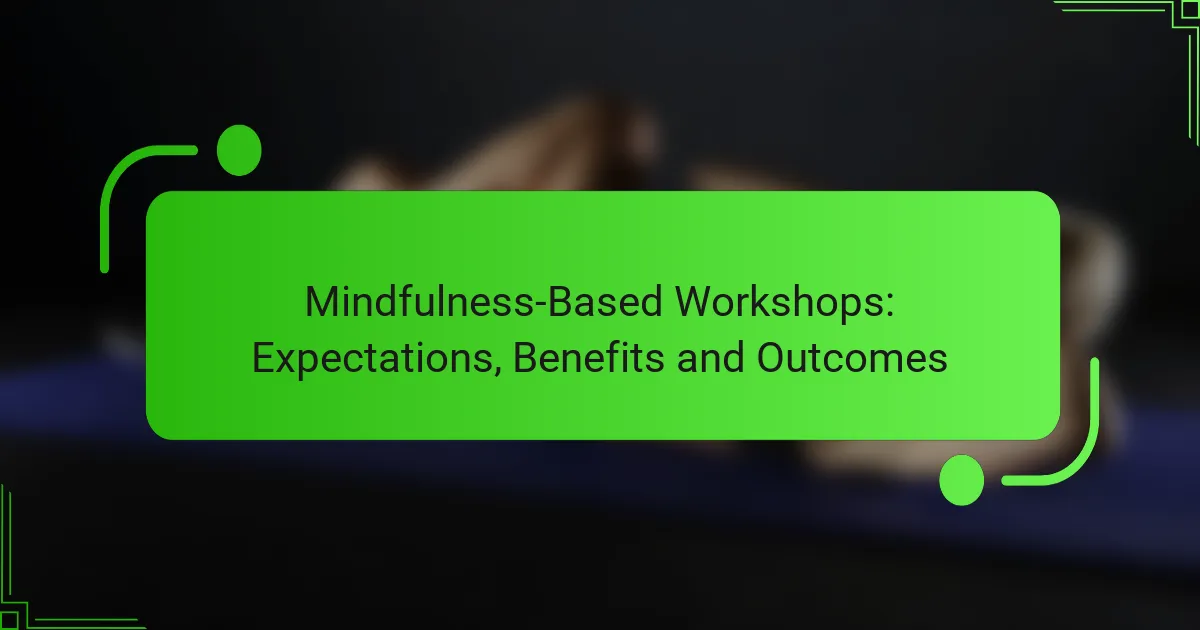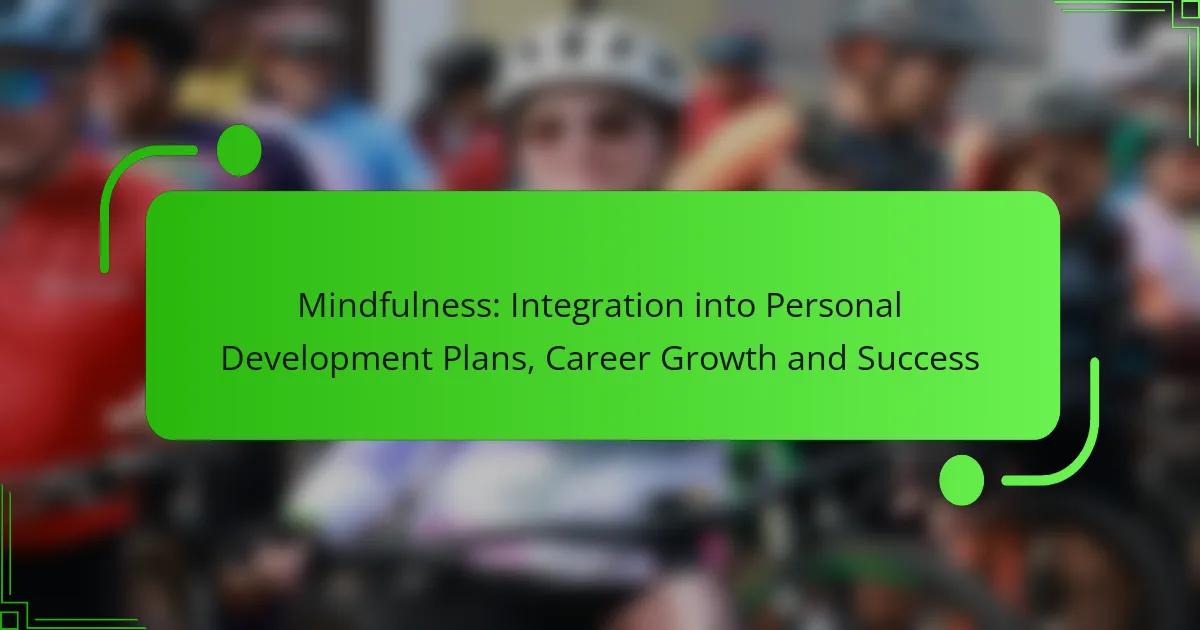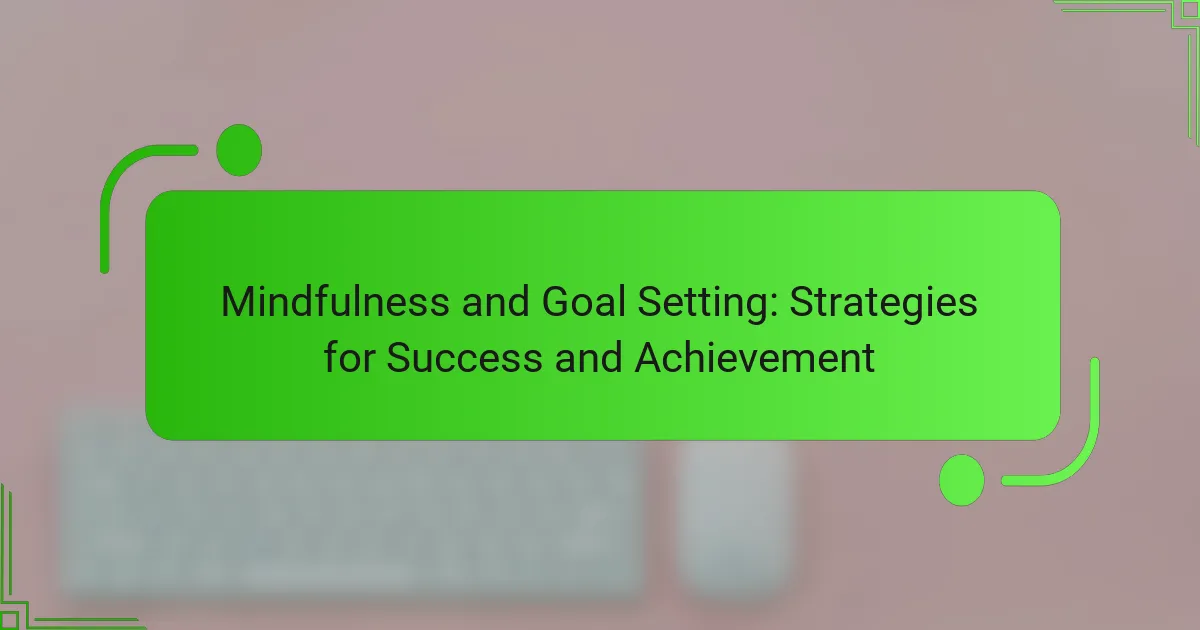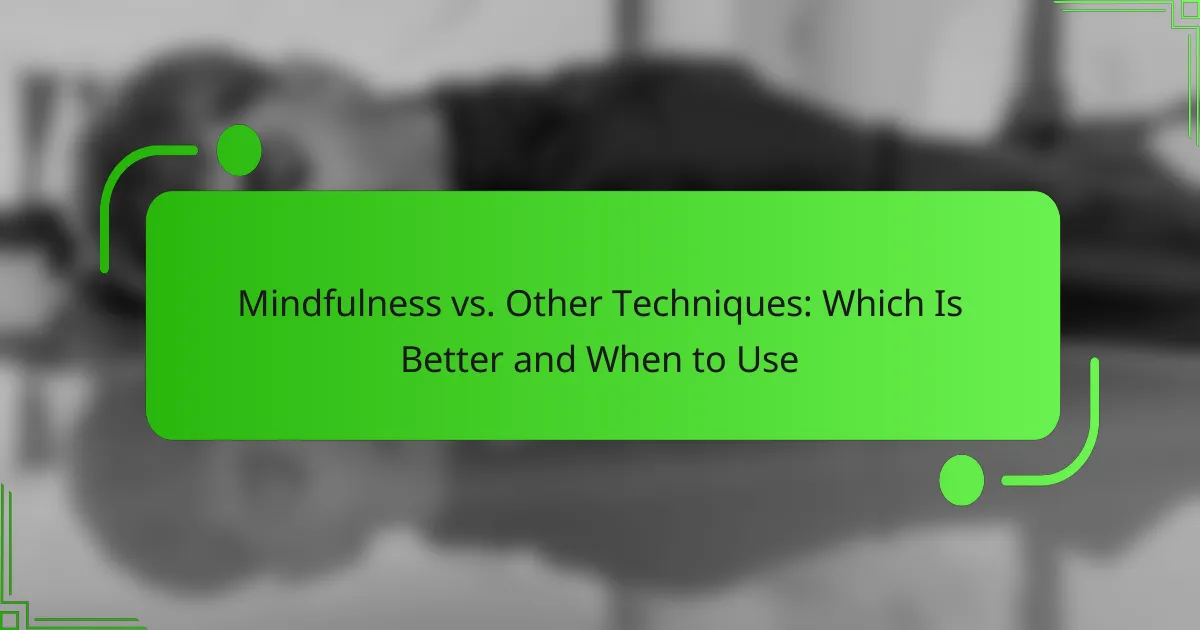Mindfulness-based workshops provide a structured environment for participants to learn and practice techniques aimed at enhancing awareness and reducing stress. Through guided exercises and group interactions, these workshops foster improved mental and emotional health, leading to benefits such as reduced stress, enhanced focus, and greater self-awareness. Ultimately, participants can expect positive changes in behavior and emotional resilience, contributing to overall well-being.
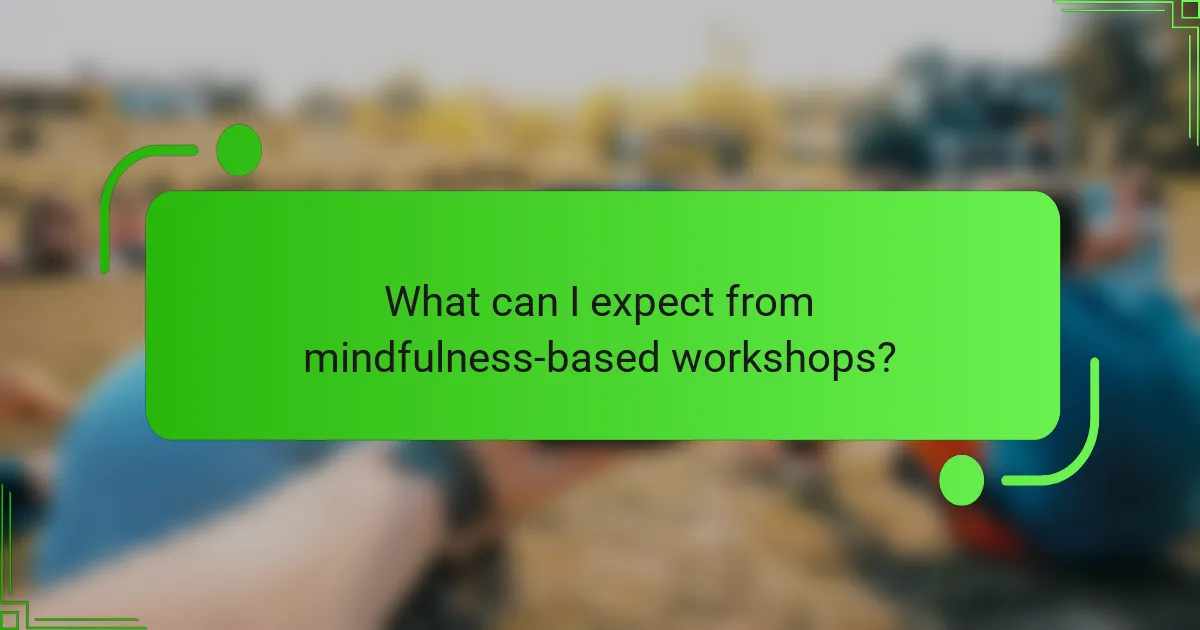
What can I expect from mindfulness-based workshops?
Mindfulness-based workshops typically offer a structured environment where participants learn and practice mindfulness techniques. Expect a combination of guided exercises, group interactions, and personal reflection aimed at enhancing your awareness and reducing stress.
Structured sessions
Structured sessions in mindfulness workshops usually follow a set agenda, providing a clear framework for learning. These sessions often include a mix of instruction, practice, and discussion, typically lasting between one to two hours each.
Participants can expect to engage in various topics, such as stress reduction, emotional regulation, and the science behind mindfulness. This structure helps ensure that all essential components are covered, allowing for a comprehensive learning experience.
Interactive activities
Interactive activities are designed to engage participants actively, making the learning process more dynamic. These may include partner exercises, group challenges, or role-playing scenarios that encourage participants to apply mindfulness concepts in real-life situations.
Such activities foster a sense of community and support, allowing individuals to share experiences and learn from one another. This interaction can enhance motivation and deepen understanding of mindfulness practices.
Guided meditations
Guided meditations are a core component of mindfulness workshops, providing participants with direct experience in mindfulness techniques. These meditations typically last from a few minutes to half an hour and are led by an instructor who offers verbal cues to help focus attention.
Expect to explore various styles of meditation, such as body scans, breath awareness, or loving-kindness practices. These sessions aim to cultivate relaxation and present-moment awareness, essential skills for effective mindfulness.
Group discussions
Group discussions allow participants to reflect on their experiences and share insights gained during the workshop. These conversations can help reinforce learning and provide different perspectives on mindfulness practices.
Facilitators often guide these discussions to ensure a safe and respectful environment, encouraging openness and vulnerability. Engaging in dialogue can deepen understanding and create a supportive community among participants.
Personal reflection time
Personal reflection time is crucial for integrating mindfulness practices into daily life. Workshops often include dedicated moments for participants to journal or meditate quietly, allowing them to process their thoughts and feelings.
This time encourages self-discovery and personal growth, helping individuals identify areas of their lives where mindfulness can be beneficial. Consider using this time to set intentions for how to incorporate mindfulness into your routine after the workshop ends.
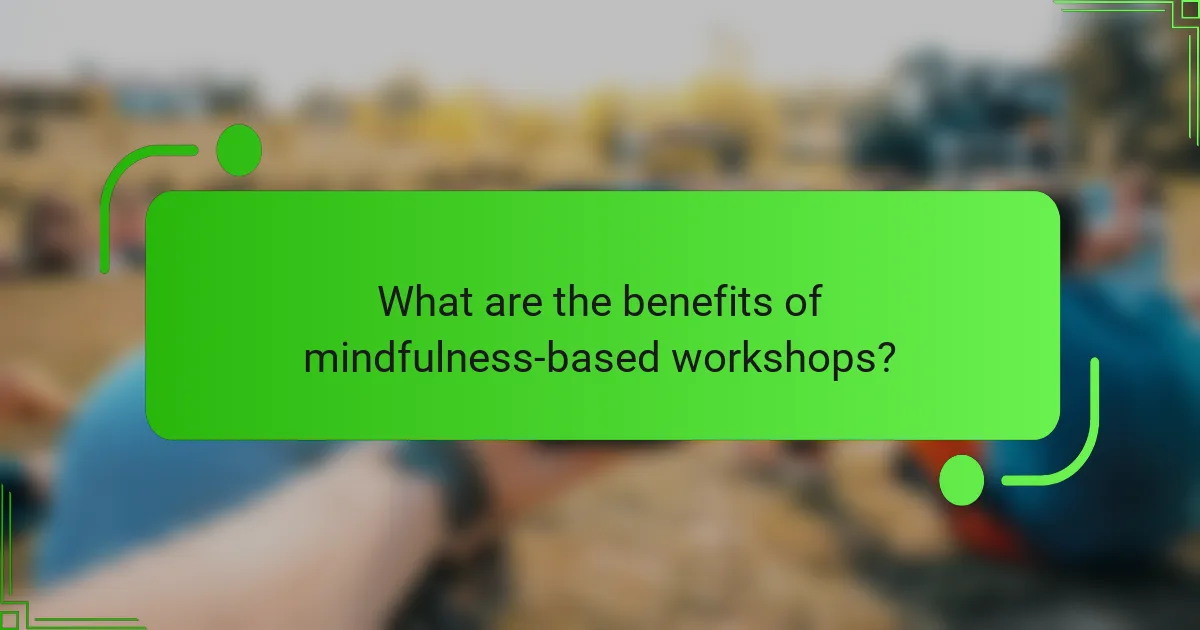
What are the benefits of mindfulness-based workshops?
Mindfulness-based workshops offer a range of benefits that enhance mental and emotional health. Participants often experience reduced stress, improved focus, and greater self-awareness, leading to better overall well-being.
Reduced stress levels
One of the primary benefits of mindfulness-based workshops is the significant reduction in stress levels. Techniques such as meditation and breathing exercises help participants manage their responses to stressors effectively.
Regular practice can lead to lower cortisol levels, which is the hormone associated with stress. Many individuals report feeling calmer and more centered after just a few sessions.
Improved focus and concentration
Mindfulness practices enhance focus and concentration by training the mind to stay present. This can be particularly beneficial in today’s fast-paced environment, where distractions are abundant.
Participants often find that they can complete tasks more efficiently and with greater attention to detail. Simple exercises, like mindful breathing, can help sharpen focus in just a few minutes.
Enhanced emotional well-being
Mindfulness workshops foster emotional well-being by promoting a greater understanding of one’s feelings. Participants learn to observe their emotions without judgment, which can lead to healthier emotional responses.
Over time, this practice can reduce symptoms of anxiety and depression, allowing individuals to experience a more balanced emotional state. Many find that they develop a more positive outlook on life as a result.
Increased self-awareness
Increased self-awareness is a key outcome of mindfulness-based workshops. Participants gain insights into their thoughts, behaviors, and triggers, which can lead to personal growth.
This heightened awareness allows individuals to make more conscious choices in their daily lives, improving decision-making and self-regulation. Journaling and reflection exercises often complement these workshops to deepen this understanding.
Better interpersonal relationships
Mindfulness can significantly improve interpersonal relationships by enhancing communication and empathy. Participants learn to listen actively and respond thoughtfully, which fosters deeper connections with others.
As individuals become more aware of their own emotions, they also become more attuned to the feelings of those around them. This can lead to more harmonious interactions and a supportive social environment.
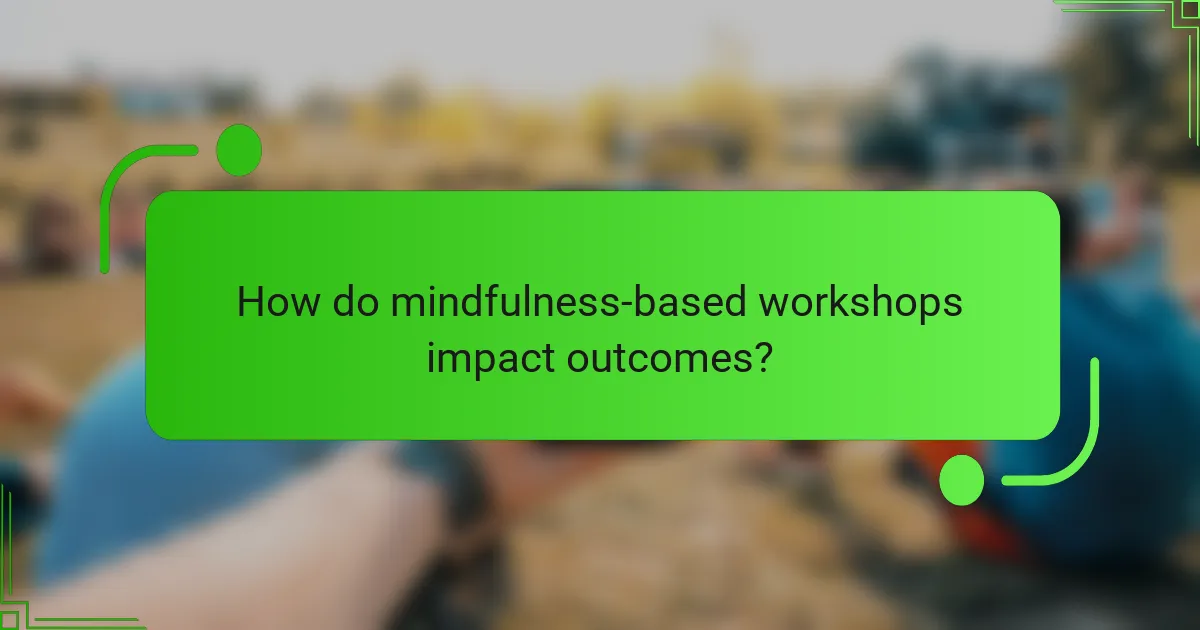
How do mindfulness-based workshops impact outcomes?
Mindfulness-based workshops significantly enhance various personal outcomes by promoting awareness and presence in daily life. Participants often experience positive changes in behavior, emotional resilience, mental health, and coping strategies.
Long-term behavioral changes
Mindfulness workshops can lead to lasting behavioral changes by encouraging participants to adopt more conscious and intentional actions. This may include improved communication skills, better stress management, and healthier lifestyle choices.
For example, individuals may find themselves more patient in challenging situations or more proactive in addressing conflicts. These changes often stem from increased self-awareness and the ability to respond thoughtfully rather than react impulsively.
Increased resilience
Attending mindfulness-based workshops can enhance resilience by equipping individuals with tools to navigate stress and adversity. Participants learn to approach difficulties with a calm and centered mindset, which can lead to better problem-solving and adaptability.
Practicing mindfulness techniques, such as meditation and breathing exercises, helps individuals build a mental buffer against stressors. Over time, this can result in a greater capacity to bounce back from setbacks and maintain emotional stability.
Improved mental health
Mindfulness workshops are associated with improvements in mental health, including reductions in anxiety and depression symptoms. The practice encourages individuals to observe their thoughts and feelings without judgment, fostering a sense of acceptance and peace.
Research indicates that regular mindfulness practice can lead to significant improvements in overall well-being. Participants often report feeling more balanced, less overwhelmed, and more in control of their emotions.
Enhanced coping strategies
Mindfulness-based workshops provide effective coping strategies that help individuals manage stress and emotional challenges. Techniques learned in these workshops can be applied in various situations, from daily stressors to major life changes.
Common strategies include mindfulness meditation, grounding exercises, and cognitive reframing. By incorporating these practices into their lives, participants can develop a toolkit for handling difficulties with greater ease and confidence.

What prerequisites should I consider before attending?
Before attending mindfulness-based workshops, it’s essential to have a few prerequisites in mind. An open mindset, basic understanding of mindfulness concepts, and a willingness to engage in self-reflection can significantly enhance your experience.
Open mindset
Having an open mindset is crucial for maximizing the benefits of mindfulness-based workshops. This means being receptive to new ideas and willing to explore different perspectives without judgment. An open attitude allows participants to fully engage with the practices and insights offered during the sessions.
To cultivate an open mindset, consider approaching the workshop with curiosity rather than skepticism. This can involve setting aside preconceived notions about mindfulness and being ready to experience it as it is presented. Remember, the goal is personal growth, which often requires stepping outside your comfort zone.
Common pitfalls include dismissing techniques that seem unfamiliar or uncomfortable. Instead, try to embrace these challenges as opportunities for learning. Keeping a journal during the workshop can help track your thoughts and feelings, reinforcing an open approach to the experience.
